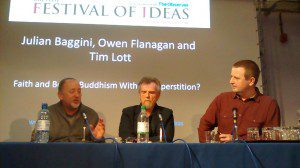 “Is it possible to take an ancient comprehensive philosophy like Buddhism, subtract the hocus pocus, and have a worthwhile philosophy for twenty-first-century scientifically informed secular thinkers?”
“Is it possible to take an ancient comprehensive philosophy like Buddhism, subtract the hocus pocus, and have a worthwhile philosophy for twenty-first-century scientifically informed secular thinkers?”
This was the quote, taken from Owen Flanagan’s recent book (see below), which served to open a discussion last Wednesday at Bristol’s “Festival of Ideas”. The event re-raised the age old question, “Buddhism, is it a religion, philosophy, or way of life?” (I wrote a bit about this topic last fall if you’d like to read more.) At the discussion, philosophers Owen Flanagan and Julian Baggini were joined by author Tim Lott to discuss the following:
Buddhism is often described as a philosophy rather than a religion, but many of its tenets, such as those of karma and rebirth, appear to be justified more by faith than scientific evidence. So can you accept any key Buddhist claims without taking on supernatural beliefs? Can Buddhism make sense within a thoroughgoing materialist worldview?
Being a somewhat introductory-level discussion of the topic and relatively short in length, it didn’t get as deep as I would have liked. Owen Flanagan was, for me at least, the major contributor, much of the discussion revolving around his 2011 book, The Bodhisattva’s Brain: Buddhism Naturalized. Julian Baggini, himself well known for making philosophy accessible to a broader audience, acted as interviewer and conversation guide, interjecting his own thoughts on only a couple occasions. Tim Lott wound up being, in a sense, the odd man out as something of an Alan Wattsian and fan of Eastern philosophy, but saying little about Buddhism (though he brings up Zen from time to time).
As a popularizer, Watts a great introduction, and Flanagan likewise noted his debt to Watts and D.T. Suzuki for sparking an interest in Buddhism, but it would have been nice if Lott could have discussed some other aspects of Zen (or Buddhism in general) in addition to what he had learned from Watts.
But not to get too bogged down in criticism; endless citations of the latest translations and anthropological surveys might have simply lulled everyone to sleep. So having an Alan Wattsian on the panel may have helped provide the same kind of gripping introduction to the topic for the audience that both of these two men had. Flanagan, for his part, did a great job of relating his work on Buddhist philosophy and his experiences with the Dalai Lama and others he met through the Mind and Life Institute. He also pointed out the divides between Tibetan Buddhism and more East Asian Buddhisms (a topic discussed in the comments of a recent post here) that seemed to be coming up again and again even in this very discussion: that Tibetan Buddhism focuses on heavily intellectual/philosophical systems while Zen/etc focuses on non-duality and spontaneity. Interestingly, as he was desribing this in terms of process philosophy, Lott interrupted at first in agreement, but then saying, “not only is everything events, but there is only one event, and it is happening now.”
You’ll see Flanagan scratching his beard; and finally responding, “so, well, so, I’m not sure if I would climb on board with that way of putting it…” before going on.
Here are three videos from the event. I missed about 5 minutes at the end of the first one where they discuss one last topic (you can find that in the audio-only file below if you’re desperate). I do recommend the talk and finding out more about all three of these guys, especially for the new-comer to various aspects of Buddhism in the West. You may be disappointed by how little they actually talk about superstition (what exactly constitutes it, how it might change over time, etc), but the wide range of topics discussed should be interesting nonetheless.
If you’re interested in more on Watts, Lott is your man; more on naturalizing (mainly Tibetan) Buddhist philosophy, check out Flanagan’s book; for lots of accessible Western philosophy, pick up some books from Baggini.












